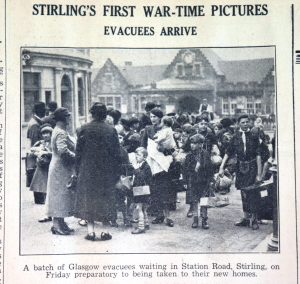It was officially announced at 11.15am on the 3rd September 1939, that Britain was at war with Germany. There are various records held in the Archives that show the reaction to this news in the local area.
We have been blogging excerpts from Thomas Winter Sheppard Graham of Rednock’s diaries from 1939 throughout this year. The entries that Thomas Graham made in his journal have given us real insight into both the build-up of international tensions throughout the first 8 months of 1939 and local actions and attitudes to the situation. His diary entry for the 3rd September is no exception to this. It is clear from earlier entries in the diary that Thomas uses it as a way of releasing tension and anxiety by writing about how he feels. This entry shows him returning to update his diary throughout the day as developments take place and therefore gives us a sense of just how stressful the situation must have been for everyone.
The entry opens with a reference to the ultimatum that Britain gave Germany to remove its troops from Poland by 11.00am that day. It had been clear for some time that war was extremely likely and when the Nazi regime begun bombing Warsaw on the 1st September, this brought matters to a head. The fact that Neville Chamberlain’s ultimatum had been delivered to Germany is the first thing that Thomas Graham refers to in his diary entry for the day. He then returns to his diary shortly after 11.15 to record the declaration announcement. The speech that Neville Chamberlain made on the BBC that day is famous.
Thomas notes that the King and Queen had decided to stay on in London despite having been advised to leave the capital. This continue to be the case throughout the war. Thomas refers to his ‘family of children’ in this diary entry. These were evacuees, 30 of whom had arrived at Rednock House the previous day. The preparations for the evacuation of city children to safe locations in the countryside had begun well in advance of the outbreak of war. Operation Pied Piper, as it was known, was planned from 1938 and over 3.5 million people were relocated under this scheme. Photographs of the newly arrived evacuees in Stirling appeared in the Stirling Observer of 5th September 1939.
Thomas describes digging trenches on his land for his household to shelter in during any aerial bombardments. This was done all over the country prior to the construction of more durable air raid shelters.
The outbreak of war was reported in the local papers and specially noted in the minutes of Stirling Town Council. A Special Meeting had already been held on the 1st of September to discuss air raid precautions and the construction of trenches and shelters. There was another Special Meeting on the 3rd of September during which the Council convened an Emergency Committee This met for the first time on the 6th of the month to discuss arrangements for the supply of both food and fuel for the area.










